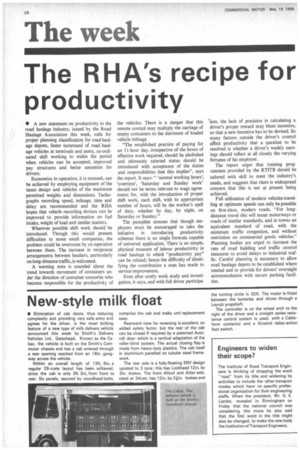The RHA's recipe for productivity
Page 28

If you've noticed an error in this article please click here to report it so we can fix it.
• A new statement on productivity in the road haulage industry, issued by the Road Haulage Association this week, calls for proper planning classification for road haulage depots, faster turnround of road haulage vehicles at terminals and ports, co-ordinated shift working to widen the period when vehicles can be accepted, improved pay structures and better amenities for drivers.
Economies in operation, it is stressed, can be achieved by employing equipment of the latest design and vehicles of the maximum permitted weights and dimensions. Tachographs recording speed, mileage, time and delay are recommended and the RHA hopes that vehicle recording devices can be improved to provide information on fuel intake, weight of load and similar matters.
Wherever possible shift work should be introduced. Though this would present difficulties to some small companies, the problem could be overcome by co-operation between them. The increase in reciprocal arrangements between hauliers, particularly on long-distance traffic, is welcomed.
A warning note is sounded about the trend towards movement of containers under the direction of container consortia who become responsible for the productivity of
the vehicles. There is a danger that this remote control may multiply the carriage of empty containers to the detriment of loaded vehicle mileage.
"The established practice of paying for an 11-hour day, irrespective of the hours of effective work required, should be abolished and ultimately salaried status should be introduced with acceptance of the duties and responsibilities that this implies", says the report. It says:" 'normal working hours', 'overtime', 'Saturday and Sunday work' should not be terms relevant to wage agreements for, with the introduction of proper shift work, each shift, with its appropriate number of hours, will be the worker's spell of duty, whether by day, by night, on Saturday or Sunday."
The pamphlet stresses that though employers must be encouraged to take the initiative in introducing productivity schemes there is no single formula capable of universal application. There is no simple, physical measure of labour productivity in road haulage to which "productivity pay" can be related; hence the difficulty of identifying the contribution a man has made to service improvement.
Even after costly work study and investigation, it says, and with full driver participa
'lion, the lack of precision in calculating a driver's proper reward may blunt incentive, so that a new incentive has to be devised. So many factors outside the driver's control affect productivity that a question to be resolved is whether a driver's weekly earnings should reflect at all closely the varying fortunes of his employer.
The report urges that training programmes provided by the RTITB should be tailored with skill to meet the industry's needs, and suggests that there is widespread concern that this is not at present being achieved.
Full utilization of modern vehicles travelling at optimum speeds can only be possible on first-class, modern roads. "For longdistance travel this will mean motorways or roads of similar standards, and in towns an equivalent standard of road, with the minimum traffic congestion, and without restriction on commercial goods vehicles." Planning bodies are urged to increase the rate of road building and traffic control measures to avoid delays to industrial traffic. Careful planning is necessary to allow road haulage depots to be established where needed and to provide for drivers' overnight accommodation with secure parking facilities.






















































































































